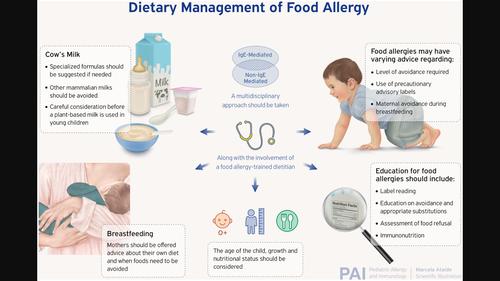当前位置:
X-MOL 学术
›
Pediatric Allergy Immunol.
›
论文详情
Our official English website, www.x-mol.net, welcomes your feedback! (Note: you will need to create a separate account there.)
Dietary management of IgE and non‐IgE‐mediated food allergies in pediatric patients
Pediatric Allergy and Immunology ( IF 4.4 ) Pub Date : 2024-03-07 , DOI: 10.1111/pai.14100 Carina Venter 1 , Franziska Roth‐Walter 2, 3 , Emilia Vassilopoulos 4 , Allison Hicks 1
Pediatric Allergy and Immunology ( IF 4.4 ) Pub Date : 2024-03-07 , DOI: 10.1111/pai.14100 Carina Venter 1 , Franziska Roth‐Walter 2, 3 , Emilia Vassilopoulos 4 , Allison Hicks 1
Affiliation

|
Food allergies (FA) consist of both IgE and non‐IgE‐mediated entities, with varying phenotypes and overlapping and different considerations for each specific disease presentation. In general, all FAs place children at increased risk for inadequate nutritional intake and negative impacts on their nutritional status, as well as negative impacts on the quality of life for the entire family. To minimize these untoward effects, a multidisciplinary approach should be taken, including consultation and management with a dietitian trained in the varying presentations of FA. Families should be instructed on label reading as a first line of nutritional management. During a nutrition consultation, the age of the child, growth, and nutritional status should be considered. Food refusal should be assessed and addressed. Families should be educated on avoidance and appropriate substitutions. In the case of cow's milk allergy, a suitable specialized formula should be suggested if the infant is not breastfed or if breast milk supply is not sufficient. Other mammalian milk should be avoided and careful consideration should be given before plant‐based milk is used in young children. Specific food allergies may differ in terms of advice provided on the level of avoidance required, whether precautionary advisory labels should be avoided, and if a maternal avoidance of the allergen during breastfeeding should be advised. The role of immunonutrition on overall health should be discussed.
中文翻译:

儿科患者 IgE 和非 IgE 介导的食物过敏的饮食管理
食物过敏 (FA) 由 IgE 和非 IgE 介导的实体组成,具有不同的表型以及针对每种特定疾病表现的重叠和不同的考虑因素。一般来说,所有 FA 都会增加儿童营养摄入不足的风险,对其营养状况产生负面影响,并对整个家庭的生活质量产生负面影响。为了最大限度地减少这些不良影响,应采取多学科方法,包括接受过不同 FA 介绍培训的营养师的咨询和管理。应指导家庭阅读标签,作为营养管理的第一线。在营养咨询期间,应考虑儿童的年龄、生长情况和营养状况。应评估并解决拒食问题。应该对家庭进行有关避免和适当替代的教育。对于牛奶过敏,如果婴儿不是母乳喂养或母乳供应不足,应建议使用合适的专门配方奶粉。应避免使用其他哺乳动物奶,并且在幼儿使用植物奶之前应仔细考虑。特定食物过敏的建议可能有所不同,包括所需避免程度、是否应避免预防性咨询标签以及是否应建议母亲在母乳喂养期间避免过敏原。应该讨论免疫营养对整体健康的作用。
更新日期:2024-03-07
中文翻译:

儿科患者 IgE 和非 IgE 介导的食物过敏的饮食管理
食物过敏 (FA) 由 IgE 和非 IgE 介导的实体组成,具有不同的表型以及针对每种特定疾病表现的重叠和不同的考虑因素。一般来说,所有 FA 都会增加儿童营养摄入不足的风险,对其营养状况产生负面影响,并对整个家庭的生活质量产生负面影响。为了最大限度地减少这些不良影响,应采取多学科方法,包括接受过不同 FA 介绍培训的营养师的咨询和管理。应指导家庭阅读标签,作为营养管理的第一线。在营养咨询期间,应考虑儿童的年龄、生长情况和营养状况。应评估并解决拒食问题。应该对家庭进行有关避免和适当替代的教育。对于牛奶过敏,如果婴儿不是母乳喂养或母乳供应不足,应建议使用合适的专门配方奶粉。应避免使用其他哺乳动物奶,并且在幼儿使用植物奶之前应仔细考虑。特定食物过敏的建议可能有所不同,包括所需避免程度、是否应避免预防性咨询标签以及是否应建议母亲在母乳喂养期间避免过敏原。应该讨论免疫营养对整体健康的作用。



























 京公网安备 11010802027423号
京公网安备 11010802027423号